Data Card - On-distance learning
On-distance learning, cohesion policies & At the School of Open Cohesion
As a response to coronavirus emergency that, among all, led to the school closure, since the first days of March the Italian Ministry of Public Education has ensured various forms of support in accessing on-distance learning. The suspension of students’ attendance to the educational activities in schools progressively covered the entire national territory, was in fact accompanied by the multiplication and creation of alternative learning environments with aim to support new teaching and learning school methods. Also “At the School of Open Cohesion ” (ASOC), innovative educational programme aimed at promoting and developing principles of active citizenship in Italian schools starting from Open Data on projects funded by European and Italian national resources, which in the 2019/2020 school edition involves 204 teams of students throughout Italy, has provided already since 6th March a redefinition of its activities related to the active on ground monitoring and instead providing the new Guidelines containing useful tips addressed to teachers and to ASOC teams for the delivery of the final creative output suitable for the online & on-distance preparation, postponing the delivery of materials relating to Lessons 3 and 4.
Online training for on-distance learning
The website of the Italian Ministry of Public Education provides cooperation tools, exchange of good practices and twinning projects among schools, training webinars, certified platforms and multimedia learning content.
The webinars, in particular, are facilitated by INDIRE (the National Institute of Documentation, Innovation and Educational Research), which in agreement with the Ministry of Public Education has launched a solidarity initiative with aim to provide to the schools an immediate support and solutions for on-distance learning by the means of innovative methodologies and tools.
Solidarity consists in activating the networks of schools participating to the Movements "Educational Avant-garde" and the "Small Schools", together with the European eTwinning community, which collaborated with the teachers and school managers of the institutes that applied. Educational Avant-garde and Small Schools are two projects financed by cohesion policies within the framework of the National Operative Plan for School 2014-2020 - Learning competences and environments.
The access to the webinars is free of charge and all these are available in an online repository. N. 115 institutes, n. 86 "Educational Avant-garde" schools and n. 29 schools of the "Small Schools" movement joined the #lascuolaperlascuola initiative.N. 181 webinars have been organized so far, for a total of over 25 thousand teachers involved.
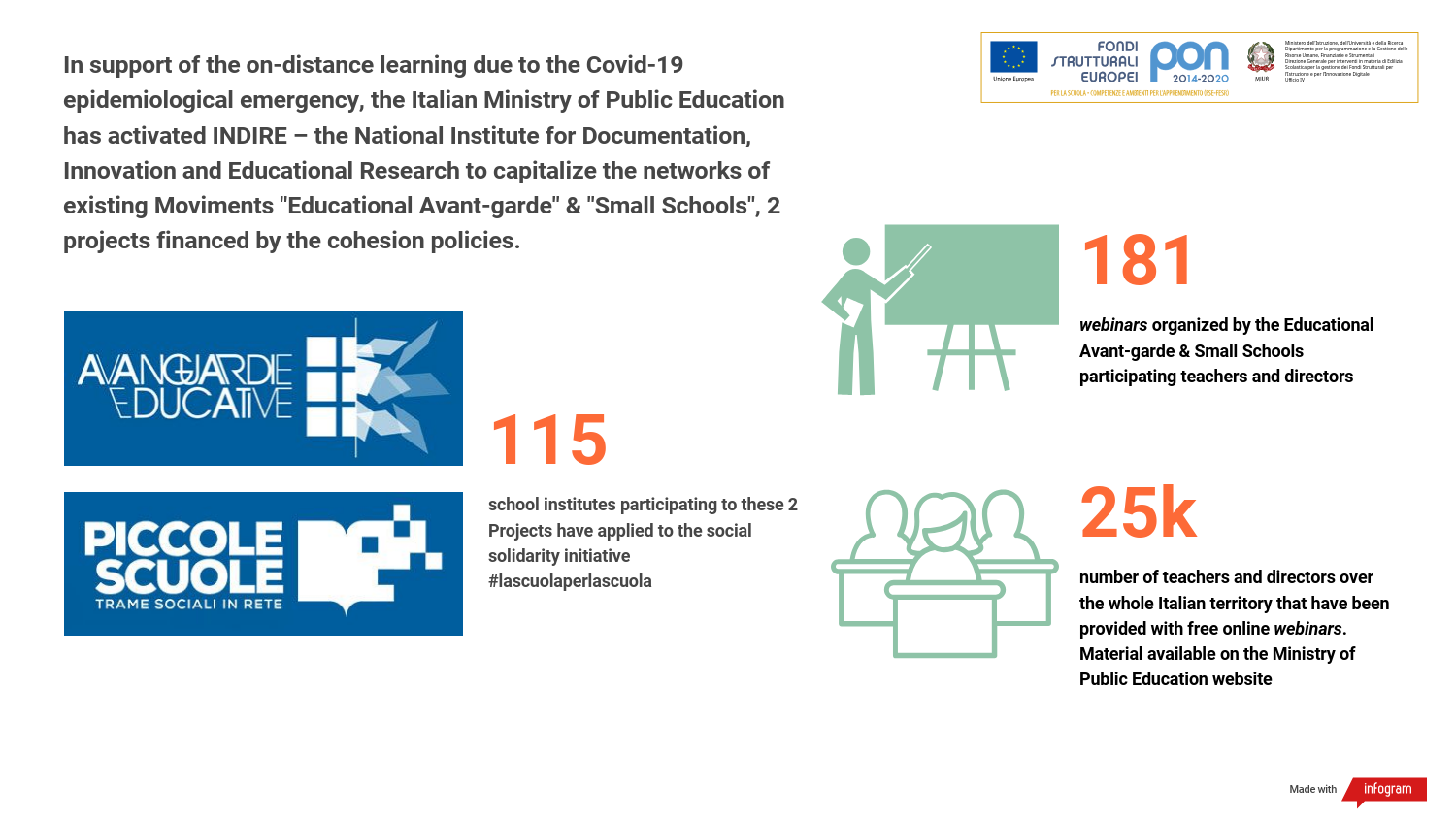
"At first we focused on the tool-relating part, necessary to reorganize both social and learning aspect of the class" says Giuseppina Jose Mangione, coordinator of the research structure "Methodological and organizational innovation in small schools" and responsible of the "Small" Movement Schools ”of INDIRE. "We have thus provided useful tools to manage virtual or hybrid classes and tools for the lessons planning, with attention to the setting (space and work times) that had changed".
Following to the preparation phase, and once the classes were set online, "the thematics have changed, and we went deeper down to the teaching methodologies" explained prof. Mangione. At that point, INDIRE was able to make synergy with resources external to the network: "The writers' portal, Lessons on the sofa, to set up the readings, the Blue Phone, to deal with the social and psychological dimensions, oriented to the well-being that had to be guaranteed, and then from the end of March also the synergie with CNR on social policies and then psychologists and pedagogists has been established".
If the webinars for teachers offered teaching tools, those for managers paid attention to the privacy topic, the online management of school boards and the active exchange with parents, the reorganization of school time.
What is Educational Avant-garde all about?
Educational Avant-garde is an action-research project - result of an INDIRE initiative aimed at identification and definition of some innovative and sustainable teaching schemes in the Italian school, taking particular account both the enabling and critical factors.
The project became a real movement and its constantly growing - it was officially established on 6th November 2014 in Genoa and opened to all Italian schools. In April 2020 n. 1125 schools are participating. The mission of the Movement is to identify, support and disseminate practices and educational models aimed at rethinking the organization of Didactics, Time and Space of learning and teaching in a constantly evolving knowledge society. The Movement is the result of a joint action of INDIRE and 22 founding schools that have signed a Manifesto for Innovation consisting of 7 macro-themes, the "reference horizons". The project budget allocation is 2,50 Mio EUR and is published on OpenCoesione:
Educational Avant-garde on OpenCoesione, CUP: B55G17000000006
What is Small Schools all about?
INDIRE has been supporting geographically isolated schools for years, in order to enhance their educational and cultural protection purpose and to contrast the depopulation phenomena. The research activity and support provided by the Institute have enabled some schools in small islands and Italian mountain areas to test common working methodologies with support of on-distance learning models and the use of technologies such as IWB and video conference.
Over the years, this collaboration has given rise to the establishment of the national network of Small Schools, initially founded by four networks of local schools. The first testing nucleus later merged into the Small Schools Movement, officially founded on 10 June 2017 in Favignana with the signing of its own Manifesto - document establishing sharing actions and values. The Movement includes 300 institutes and 1500 small schools in the national territory. The "Small Schools" research project has been eligible for funding under the PON since 2016.The project budget allocation is 1,2 Mio EUR and is published on OpenCoesione:
Small Schools on OpenCoesione, CUP: B59B17000010006
At the School of Open Cohesion and on-distance learning: survey conducted among the teachers
The ASOC educational programme is an additional project in comparison to the ordinary activities of schools who decided to join and adopt it. However the ASOC education is often managed by teachers in close connection with ordinary teaching activities, and provides the online content by the means of MOOC (Massive Open Online Courses) and the structured organization of the working group classes, foreseeing use of technologies, online sharing tools, blogs and social networks.
Following the suspension of the usual off-line teaching activity provided by the Decree of the President of the Council of Ministers in March 2020, a structured survey was set out and submitted to approximately 300 teachers participating in the 2019-2020 edition of the ASOC project (nr. of teachers is higher than a nr. of teams since, a part of the responsible teacher, also another supporting teacher is involved).
The aim of the survey is to understand better the type of activities that have actually been put in place to reach the students during the school closure, and to gather the inputs related to any critical issues and to explore whether having already activated on-distance learning projects such as ASOC has enabled teachers and students in this period of emergency in managing and integrating on-distance learning tools. At the School of Open Cohesion involves different types of high schools (classic, scientific, technical, professional etc.) and various subjects teachers, from Italian to foreign languages, from mathematics to science.
About 65% of the teachers involved in the 2019-2020 ASOC replied to the survey. Highlighted results: almost all (about 98%) of ASOC teachers are involved in on-distance teaching activities, relying on technological infrastructures that already exist or have been activated by their school institute to meet the educational needs during the COVID-19 emergency period. In 70 percent of cases, all students are able to access to the online teaching activities.
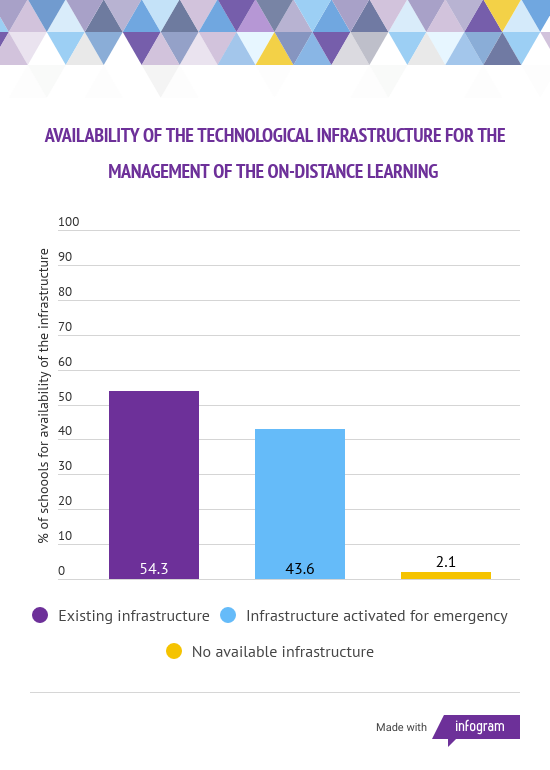
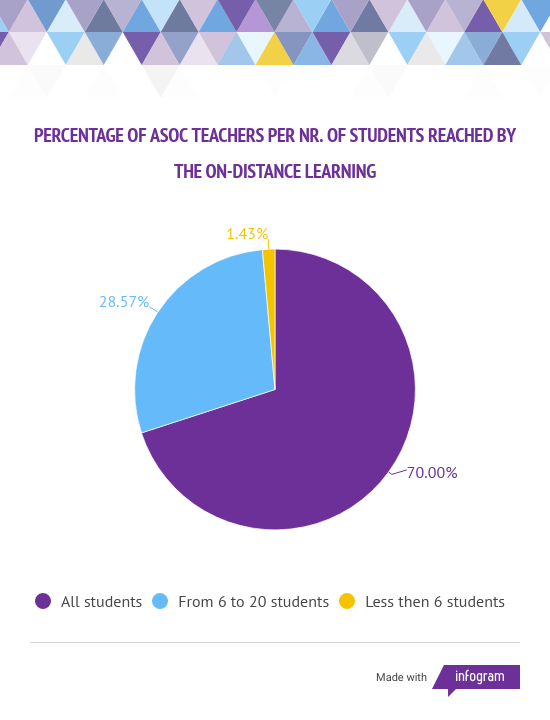
The most used tools are different digital platforms and services, but also the "classic" sharing via email of the homeworks and teaching materials, or the online video conference platforms. The teachers are quite engaged (often double time commitment is required in comparison to the ordinary teaching), but thanks to the digital infrastructure provided by the school and the great dedicated effort, all teachers were able to reach almost all of their students and provide them the contents of the lessons.
80% of the teachers also replied that the Educational programme learning methodology used by the At the School of OpenCohesion characterized by a strong digital component, was very helpful in this phase, underlining that, thanks to the participation in ASOC, many students have enhanced their digital skills and the use of remote learning technologies (video conferences, collaborative tools such as Google Drive), organizational skills (thanks above all to the division into operational roles that the path requires) and collaborative teamwork - respect of the scheduled deadlines and calendars. In addition, the teachers noticed a greater awareness and creativity in the use of technologies and social networks by their students, as well as a strengthening of transversal skills(relational, communicative).
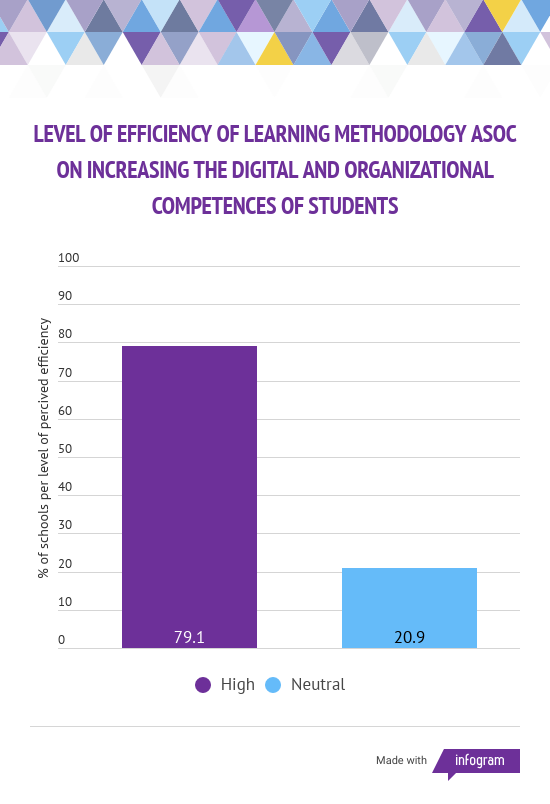
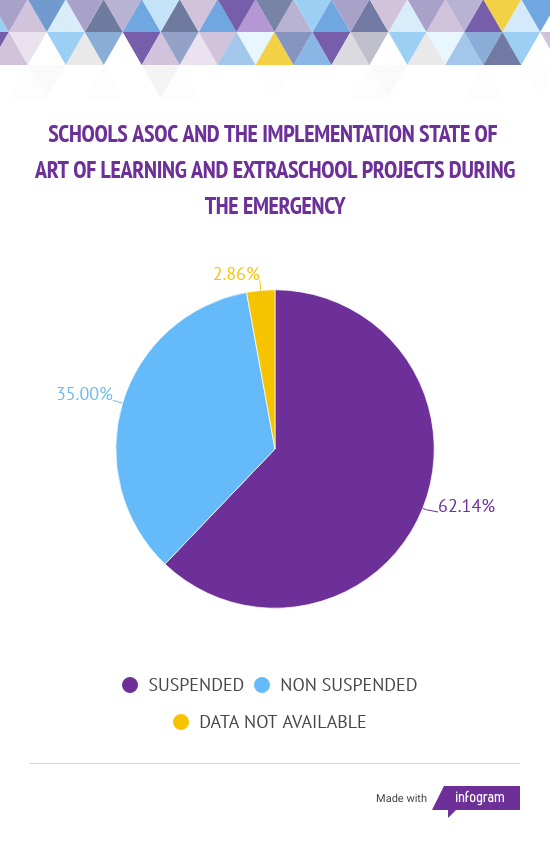
Furthermore, starting from the 2017-2018 school year, ASOC teachers have had access to training courses, created by the means of distance learning, in order to enhance new skills that can also be used with students. In the school year 2019-2020, besides the course "At the School of OpenCohesion - Basic training", for the first time was held At the School of OpenCohesion - Introduction to Statistic culture +", with detailed modules on data and statistical information (mainly aimed to teachers who have already participated in previous editions of ASOC). The Introduction to Statistic culture+ was carried out in collaboration with ISTAT, and had seen high participatory engagement embraced with great enthusiasm by the teachers of ASOC. Both courses are active on the S.O.F.I.A. (Operating System for Training and Updating Initiatives for teachers) of the Ministry of Education.
